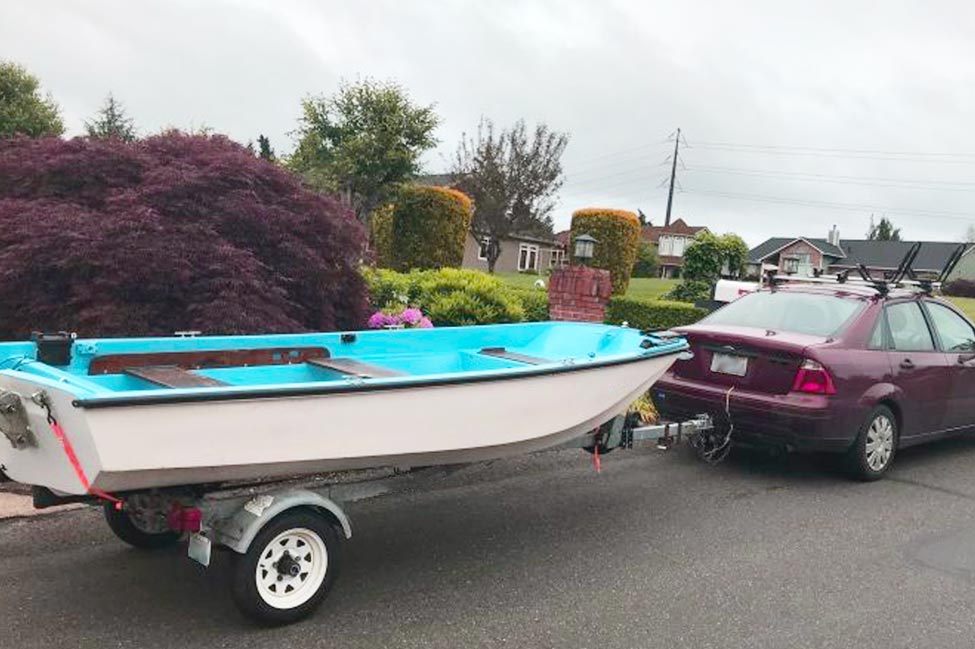About 20 years ago when I decided to start my business I was young and naive and I didn’t really have a plan. My wife and I had just gotten back together, after almost getting divorced, and I was afraid that if I didn’t make a change, fast, I’d lose her for good. My job at the warehouse wasn’t enough to pay the bills, let alone provide for any kind of a future. And our 3rd child, Hope, had just been born. So I started my business.
And when I did…I just started working, I wasn’t too concerned with the details…because I had bigger fish to fry…keeping my family together.
I provided services to my customers and they paid me either by cash or with a check written directly to me. I’d put the money in my personal bank account and paid both personal and business expenses out of that account. We were thrilled and I was relieved that it was working out, but what I didn’t know was…I was setting myself up for trouble.
My plan back then was to concentrate on getting customers, doing the work, and growing my business. But I was neglecting a very important part of my business, keeping the books. I was horrible at keeping track of everything. One of the problems with not keeping the books was, I had no idea how much I was profiting. But I was just thrilled to be making money outside of a job. It wasn’t until tax time rolled around that I wished I’d done a better job.
You see my philosophy, or lack of one, was to just write a check and deal with it later. And when later came, April 15, I still hadn’t dealt with it. Sure I had the bank statements and check stubs that showed how much money went in and where it was spent, but I had no idea which expenses were for business and which were for personal.
Of course some things were recognizable. I knew that the payment to the landlord was for rent and the electric bill was for the house…so these were personal expenses. But what I didn’t know was…that because I was operating out of our home, a portion of our rent, utilities and other expenses could be deducted.
And as tax-time came and went, procrastination gave way to the fear of sitting in a jail cell. So I sat down and began sifting through my receipts. The task was difficult and painful but after a time I was able to make some sense of it all. And as I boldly tackled the 1040 form and wrestled with the Schedule C, I was excited to see that my first year in business was a really good one. I’d made almost 3 times the amount of money I would have as an employee.
Of course I didn’t take all the deductions I should have. And, because I wanted to prove…that my decision to take the leap and become a business owner was the right one…I wanted the number on the Net Profit line to be Big One. I know…it’s crazy now when I think about it. But I was setting myself up to write a BIG CHECK. But there’s more.
As I continued working on my taxes I came to one particular line, line 57 on the 1040. That line said I’d need to fill out yet another form, a Schedule SE, for self-employment taxes. That’s when I learned, not only was I required to pay income taxes on everything the government determined was my profit, or income, for the year, but I’d also be paying an additional amount for Social Security and Medicare.
OK the good news was; I was now officially entered into the ranks of the Self Employed. But the bad news was, since I employed myself, I was required to withhold a certain percentage of my income for self-employment taxes. And…because I was also the employer, I was then required to match that amount and submit that money to the government. It came out to be slightly over 15% of my income. I couldn’t believe it.
As I added the income taxes due to the self-employment taxes due, the number seemed too big, I was in shock. “This is what I owe?”
I kept punching the numbers into the calculator hoping it would change but each time the result was the same, I had to write a really big check. It was more than I had in my checking account at the time.
Needless to say, after that first year I dramatically changed the way I ran my business. Here’s what I did to fix it and…if your just starting out, this is what I suggest you do too.
Number one. I Hired An Accountant
I know you’re probably not thinking about this right now and you don’t really know what all your needs are yet, especially if you haven’t even started your business, but the first thing you should do is interview at least 3 accountants.
Unfortunately it wasn’t until after I wrote that big check, that I found a competent accountant do my taxes for me. But a good accountant can do much more than your taxes. He or she will be able to provide you with help in many areas. Not only can she help you keep your books and file your taxes, but you’ll also have someone on your side to assist in making decisions about how you should set up your business. She can be your guide when making purchasing decisions and provide the best options for setting up depreciation schedules for your trucks.
And for those of you who don’t know, depreciation just means writing off your truck, equipment and real estate over time. This is valuable because it allows you to shield your income, for a time, from taxes.
Another great benefit of having an accountant is that when it comes time to sell, a good accountant will help you structure the sale so that you incur the least amount of tax. You don’t want to work hard to build your business only to sell it and give the government half…an accountant can help.
Number Two: I Set Up My Business As An LLC
What’s so great about an LLC?
LLC stands for Limited Liability Company and is defined by the Small Business Administration as, “a separate and distinct legal entity”. It’s like another person. It can open a bank account and get an FEIN, which stands for Federal Employer Identification Number (and you’ll need one of these to do business), and it can do business under its own name. But the great thing about an LLC, and the reason I suggest you run your towing business as an LLC, is because it limits your personal liability.
What I was doing when I started was operating as a Sole Proprietor…and I was leaving myself and my family open to whatever may come. Don’t do this.
You see with an LLC, if there are any problems, like you’re involved in an accident and are sued, or the LLC goes bankrupt, in most cases, you will not be held personally accountable. Of course there are exemptions from this. Like if you personally guarantee a loan or if you haven’t paid your taxes. But an LLC can keep you from losing everything if something bad happens.
But know this, an LLC does not shield you from paying taxes on all your profits…that’s another story.
Number Three: I Kept Accurate Records And Kept My Money Separate
One of the reasons I paid so much in taxes that first year was because I didn’t keep accurate records. There were so many things that I didn’t know were tax deductible. I could have taken mileage deductions, repairs, rent and many others…if only I had consulted with an accountant and taken the time to keep accurate records.
Back then I would make purchases for personal and business with one check…without any regard for the consequences. Sure part of it was because it seemed like I had discovered the pot of gold at the end of the rainbow, and there was no need to worry about the taxes because…I’d just go make more money. But my biggest problem was my reluctance to do the paperwork and keep track of everything.
So I opened a separate bank account for the LLC and only ran business expenses out it. All the money that came into the business was deposited into that account and I paid myself with a paycheck every 2 weeks. The tool I used to help me keep track of everything was Quick-Books. It’s a little tough to learn at first but once you get the hang of it you’ll love it. I use Quick-Books On-line now. But for this tool to be effective, you need to use it properly. And with Quick-books that means you need to enter and code every transaction properly.
Whatever tool you use just know that keeping the books is an important part of building your business.
My hope for you, and the reason why I started The Tow Academy, is to save you time, money, and a whole lot of heartache. And to give you the confidence you need to know that you are enough, no matter what you might think, to start and grow your own towing business.







Leave A Comment